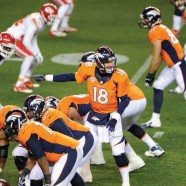
He’s a master of relaxed, congenial banter. Just ahead of him was a game that would end in a three-point overtime loss by the Broncos to New England—after midnight on a wind-whipped field. Trim and dapper in his orange Broncos’ warm-up jacket, Joe Ellis ’76 casually answered a stream of questions about what it takes to lead an enterprise that is intensely talent-dependent: talent in executing game-winning football, and talent in growing a brand experience that millions consider part of their lives.
Joe describes the Denver Broncos as “the most highly visible business in the Rocky Mountain region.” Few organizations, for better or worse, are as vitally connected to their stakeholders as sports franchises. During his nearly 20 years with the Broncos organization—and its president since 2011—Joe has helped build the team’s thriving enterprise, publicly acknowledged as one of the most “fan-friendly” in the country. He has weathered the troughs of despair and the pinnacles of success.
Joe has, for instance, stood solo at a mic, answering for the decision to hire and fire Josh McDaniels, who came to the Broncos in 2009 from the Patriots’ staff to become the youngest coach in the NFL. In 2011 he helped team owner, Pat Bowlen, position John Elway, Hall of Famer and former Broncos quarterback, to restore the team’s stature and the fans’ faith. In 2013, Joe was seared by the pain of 75,000 freezing cold, devastated fans as the Broncos lost the AFC championship to the Ravens in Mile High Stadium.
Legions of people are entitled to judge the Broncos and, in many ways, define the club’s future: season ticket holders, players, coaches, media activists of all kinds, more than 200 full-time (and another 200 part-time) Broncos staff, Denver civic leaders, regional business leaders, Rocky Mountain football fans and foes. “Our supporters invest so much of themselves in the Broncos,” says Joe. “Time, money and emotion. And I mean lots of emotion.”
 The season—the 20 games including playoffs—is predictably frenzied. “Things come up that you don’t expect. They happen quickly, and news travels fast,” Joe says. “You need to deal immediately and very sensitively, and decisions are always public.”
The season—the 20 games including playoffs—is predictably frenzied. “Things come up that you don’t expect. They happen quickly, and news travels fast,” Joe says. “You need to deal immediately and very sensitively, and decisions are always public.”
During his years with the team, Joe has been involved with nearly every aspect of the business. His hands-on experience in marketing, operations, capital improvement, legal and personnel issues, community development and team management has served the Broncos well. Optimizing digital media, so fans can “touch their team” and share their football experience in any and all moments, is the obvious growth area for the business, and that is frontier territory for everyone.
Apart from the football team, the Broncos organization includes divisions for overall business development (marketing, tickets, premium suites, sponsorships, special events and anything connected with the ability to drive revenue) and stadium management. Staying absolutely up-to-date on every front, day-by-day, is critical, and Joe spends most days “updating” himself. He gets out of his office and relies on one-on-one conversations “all over the building” more than on the routine meetings. That helps him stay on top of “the pulse of our business,” he says, “which includes the team itself, the public perception of the team, and the business world—what people are willing to do with us now and down the road.”
John Elway, who came onboard as vice president of football operations, has “stand alone executive authority for hiring and firing coaches, drafting players, signing free agents, and shaping the roster,” according to Joe. Then, coach John Fox takes over.
Joe says that he stays out of John Elway’s realm, except if he perceives that a decision might have a negative impact on the team’s brand or identity.
For Joe, two issues focus and drive every decision: “Does it help us win games?” and “Are we going about this the right way?” That is, will it help people maintain their faith and trust in the Denver Broncos? How do they know what “the right way” is? “Our own experience and past history teach us a lot,” Joe says. “We know the history of other highly visible companies, and then we have this ‘free market research’: the instant response and nonstop conversation across all media by anyone and everyone. Generally, we have very small windows to address problems and crises that arise.
“Listening—all the time, and to people who know more than I do,” Joe says, is his main tool in moving the whole enterprise forward, whether that’s solving imminent problems or setting business strategy. “That means you need to hire people who know a ton—much more about their area of responsibility than you do,” he says. “Frankly, in our world, that often means younger people. They’re driven, ambitious, and have the energy and attention span to navigate the faster pace of today’s business world.
“Also, managing our business, which is all about people, demands constant communication: written, oral, and in every possible format. Getting everyone on the same page—whether that’s the football operation, or the business staff, or our supporters—means that we are constantly in touch. We can never let anything lie. We have to stay on top of things until they’re resolved to the point where all parties understand what has happened, and what has to happen next.”
People who join the Broncos organization find the company culture appealing, and they tend to stay, Joe says. What’s important to him is not only particular skills but also a certain attitude. People have to take what they do seriously, but not take themselves too seriously.
“This is such a high-profile, high-ego business that you could get caught up in thinking you’re more important than you are,” says Joe. “You have to show respect, for each other and for the company. You need to understand that what you do is very important to a lot of people. Our supporters invest so much of themselves in us. We have to be on our toes, and provide them the best possible football experience and the best game experience.”
In fact, one of the most significant on-the-job challenges for Joe has been learning to communicate firmly but fairly with high-profile individuals: season ticket owners, star players, executives, or up-and-comers. “Being clear, direct, fair and honest” at all times means everything. “So much of people’s willingness to come together as a team depends on trust and honesty,” he says. “And football is a game where everybody means so much to each other, on and off the field.”
Teams have plenty of down cycles, and plenty of critics. When criticism from inside and outside swirls, leadership has to work at keeping morale and focus strong. “You have to balance things,” Joe says. “Football people—coaches and players—tend to know where their team is, and if it needs improvement, they’re generally honest about that. You have to weather some difficult times. You have to communicate, stay in touch, even more during bad times than in good.”
As pervasive as Twitter and texting have become, using them can spin a communication, building animosity and misunderstanding, creating a far more lasting and damaging situation. Sometimes face-to-face communication is the only right way. “That’s why I spend so much time walking around, talking with people,” Joe says.
Mistakes are inevitable, but letting them linger makes them worse. Still, situations are often complex and delicate. “Taking steps as soon we can, and in a public manner, is important,” Joe says, “but sometimes you have to let things play out a bit.” Fans learn that the leadership isn’t infallible, Joe explains, but that we’re trying to do the right thing. That perception is just as important for employees as it is for the public. “You can’t hide,” he points out. “Everyone sees and hears everything.”
In terms of finding the right mix of talented players, Joe explained that coaches tend to blend their players for the kind of team they’re building. That might be a tough-minded defensive team with lots of grinding players on offense, for example, or a fast, flashy offense that isn’t physically big but has lots of skill. Players want to be led; they want to win, and good coaching is critical. They want to be treated fairly and honestly. “If you can accomplish those things,” Joe says, “you should be successful with the right mix of guys.” Other things are key, too, he points out, like good leadership from a core group of players, and outstanding role models. The quarterback is a team’s cornerstone player, and Peyton Manning is an exceptional person, in terms of abilities and leadership. “His conscientiousness and attention to detail rubs off on everyone, everywhere,” Joe says.
Football games themselves, Joe admits, are the best and worst of times. Watching football live, on the field, is one of the greatest things to do, in his mind. The 75,000 people that gather in Mile High Stadium are so excited to be there. “I marvel at how much they share the feeling of anticipation and fun,” Joe says. The game itself, however, is “three and a half hours of unfiltered misery. I wish every game were perfect. That is the aspiration, but it’s unrealistic. We’ve never had a perfect game. Some people deal with that better than others, and I struggle with it. Last year, at the end of the playoff game against the Ravens, I was devastated. I looked up at the stands as I was leaving the field. It was after midnight, minus six degrees, and everyone had stayed right there, in their seats. No one had left. They were so disappointed. They may have gotten over it before I did, and here they are again this season, loving the experience of touching their team.”
—Cathleen D. Everett



